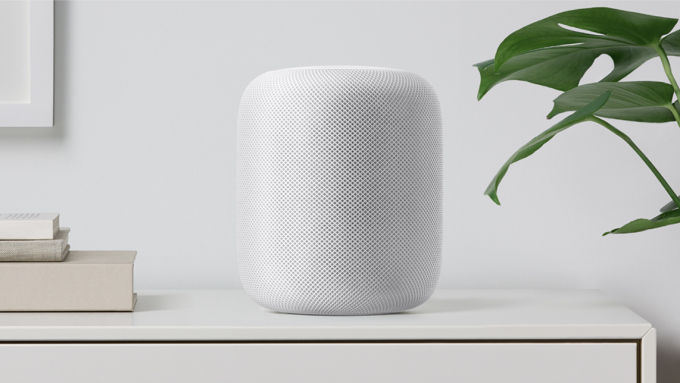ã€Global Internet Reporter Zhang Zhiying】 Apple has finally entered the smart speaker. Who is more nervous about Amazon and Apple?
Intelligent voice is regarded as the next technological revolution and is a must for manufacturers. Following Amazon’s launch of Echo in 2014, Google’s parent company Alphabet followed closely after launching Google Home last year; Microsoft’s Cortana also recently launched a new smart speaker with Harman International Industries. Therefore, the launch of Apple's HomePod has caused a lot of media attention over the past few days.

Apple Smart Speaker HomePod
Faced with the active layout and fierce competition from various big manufacturers, Apple CEO Tim Cook said he was not worried about Amazon Echo and Google Home. He said that Apple never "fights for the first", but rather does the best product and provides a better experience.
Apple HomePod pays more attention to the sound quality of the speaker itself. Music is the main focus of HomePod. This speaker uses Siri as the operating system to play user-on-demand songs. It can also control home products connected to Apple devices, such as thermostats and lamps. Tim Cook said that Apple hopes to take the experience and attitude of doing music equipment such as the iPod to do home music equipment.
According to foreign media Engadget reports, when the HomePod was launched, Apple spent most of its time emphasizing the device's audio technology, while placing the voice assistant Siri function almost in a secondary position. Apple first used Siri as a "musician" to help users discover new artists. Of course, smart home control and weather forecasting functions are available, but the main reason for buying HomePod is not for these reasons. The report believes that Apple did not even mention support for third-party features, and perhaps should not expect it to handle more than a limited range of tasks. In other words, the HomePod is not quite like an Echo-like smart speaker, but more like a Sonos home smart audio system.
In the majority of the plant voice technology, Apple HomePod's positioning is quite bold. Professional media also have different views on this, and one party believes that avoiding competition with Amazon, paying attention to soft power and mastering iTune music library and hardware sound quality of Apple will go a long way, and the other side believes that the main music may not be able to meet Consumer demand.
Engadget pointed out that in the long run, HomePod's combination of music priorities and high prices will make it an alien. After all, how many people are really willing to pay a price of $349 in order to get a smart speaker whose sound quality is only above average? Why not choose a speaker you like and use it with Echo Dot?
At present, Apple is struggling to occupy a place for HomeKit through smart home speakers. Bill Ablondi, director of strategic home services research at Strategy Analytics, points out that “Apple has been working with manufacturers such as Logitech, Lutron, Honeywell, and Leviton in recent months. Its HomeKit ecosystem of smart home devices and performance ecosystem; family center supported by Siri will promote and encourage more brand manufacturers to join. Apple smart speakers will also attract consumers to give priority to the use of Apple streaming music services."
It can be imagined whether Apple can successfully attack the market by relying on music-oriented smart speakers, whether it can successfully establish the soft power of smart homes, and successfully complete the family ecosystem, making it a dense living network. Otherwise, when the future Amazon and Google will catch up with the sound quality, Apple's advantage will no longer exist. For Apple, the front is also worth looking forward to, but it is not good to fight.
Amazon launched smart speakers, behind the huge Amazon e-commerce platform, it is to strengthen its core business. Amazon Echo opened the home smart speaker market and gained first-mover advantage. According to Strategy Analytics statistics, Echo sold more than 6.5 million units in 2016 and 1.7 million units in 2015, and it is expected to exceed 10 million units in 2017. A report released by eMarketer, a market consulting company, pointed out that approximately 70.6% of U.S. voice smart speaker users use Amazon products, Google only accounts for 23.8%, and other companies collectively hold 5.6% of the market. These companies include Lenovo, LG, and Hamann. Catton, Mattel.
David Limp, senior vice president of Amazon's equipment division, represented the company for the first time to formally respond to HomePod. According to news on June 8th, at the "Wired Business Conference" held in New York, Lump revealed to a group of reporters: "From our point of view, there are philosophical differences in smart speakers."
Linp said that Amazon makes its Echo device cheap enough that people can put it in every room in the home. The price of HomePod is much higher. If you put a HomePod in each room, the expenses for most customers will be very huge.
Interestingly, foreign media CNET pointed out that if Amazon's equipment owners are nervous about Apple's new smart speaker HomePod, he will not show it.
Smart voice will be the next disruptive technology like a smartphone. In the days when this technology has not yet been popularized, with a limited number of users, major manufacturers are inevitably in a competitive situation. In the long run, the layout of the major plants and waiting for more than certainly this, this vast blue ocean, if you can occupy a place in advance, for their own unique positioning, whether it is a high-priced experience of Apple HomePod, or cheap and practical Amazon Echo, he will be able to find his own sky at the moment of departure. Before that day, the immediate task was the battle ahead.
Can HomePod win the favor of users? What is the user's heart? Whose strategy is smarter? Can Apple attract new users or fruit powder? These have to be observed constantly.
Shenzhen Jianjiantong Technology Co., Ltd. , https://www.tpuprotector.com